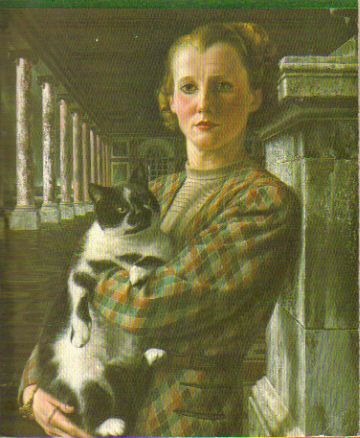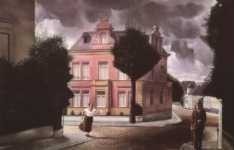Ellen and Jim Have a Blog, Too
We are two part-time academics. Ellen teaches in the English department and Jim in the IT program at George Mason University.


Persephone v Virago Books · 30 September 06
Dear Clare,
Thank you for your comment. I am on Dovegreybooks @ Yahoo. I don’t actively participate on all the lists I’m on. I couldn’t.
I would like to say though (and this has nothing, nothing to do with the list or its membership, but is about the books), the Persephone books are different than the Virago and aimed at a much narrower and at the same time non-, or anti-feminist niche, strange as that may sound. You can find books Virago publishes very like BookerPrize or Orange Prize books; many of the Persephone books are not.
Persephone books correspond to the "aga-saga" and early 1950s types, which Philips identifies, though with a strong penumbra of sentimentality and characters usually well-heeled. The authors are often authors of socially-acceptable and traditional children’s books too. The agenda is conservative even if many of the books actually are not. That is why they want to distinguish themselves from Virago which does publish feminist as well as non-feminist books.
Virago is associated with the desire to bring back forgotten and erased women and make their books as valued as men’s. Persephone books wants to avoid that agenda or at least not be openly associated with it (even if that’s partly what they’re doing too). When I remarked on 19thCenturyLit that the valuation of Conrad and Stevenson as the sole great authors of the 1890s in popular memory erases and makes hard to find and expensive to buy Henrietta Stannard’s A Blameless Woman (about a woman tricked into marrying someone already married who then decides to stay with the man, or is driven into it) and Frances Hodgson Burnett’s Through One Administration I was immediately tarred as someone who wants to erase men’s books and the ultimate accusation thrown at all feminists openly, a man-hater (with vibes about not liking sex and not liking intelligent action worldly books about public issues by men).
Philips’s argument is that pop and middle brow books present and examine or simply dramatize the same issues and themes we find in high brow books. A. S. Byatt’s Possession is a good example of "high culture" book which is a romance like those we find in middle and low brow examples. Philips says these terms are stigmatizing and unfair, and they often function as slurs on women’s books in particular.
I thought though, as I wrote, the books described from the 1990s and recently, especially "resentful daughters" (aka "post-feminist") and "single woman seeking man" (aka chick-lit) were anti-feminist, and, more importantly in for this argument, caricature, books which exacerbate women’s problems (and may be seen as choices which please male publishers), poor books which we’d not find on Man Booker Prize and I hope not Orange prize lists. One way in which Possession was dissed was to call it woman’s romance.
I conclude this letter with the cover illustration for Virago edition of Laura (Ursula Chetwynd-) Talbot’s The Gentlewoman (1952), Carol Willink’s Wilma with Cat (1940).

I so enjoyed The Gentlewoman’s exhilarating bitterness when I came across it before the Net (1980s), I never forgot it, and one of the first books I bought from Bookfinder was my copy whose
cover illustration you see here.
The undercurrents of Willink’s surreal vision are made more graphic in his Bad Tidings:
Wilma with Cat is an epitome of many a subtle Virago book. Disquieting, with glimpses of ancient hopes.
Sylvia
--
Posted by: Ellen
* * *
Comment
- Dear Kathy,
For DoveGrey, here are the addresses:
dovegreybooks@yahoogroups.co.uk
dovegreybooks-subscribe@yahoogroups.co.uk
dovegreybooks-unsubscribe@yahoogroups.co.uk
As far as I know, it's not an invitation-only list; that is, when I joined, I just joined. There was not even a waiting period where the listowner lets you on. She may have changed the settings since then though.
Sylvia
— Sylvia Sep 30, 11:14pm # - The conversational threead on women writers continued:
"Anne Tyler was the first author to make me realise (this is really shameful)that American writers were capable of speaking to me just as powerfully as British ones. I must get hold of more but have so far only read The Accidental Tourist and, one of my favourite books ever, Breathing Lessons. Clare"
"I too like Anne Tyler very much – her books are the sort of books that one reads and possibly passes off as ‘slight’ – but weeks later one realises that they are still in one’s mind and being thought about! I will put her new book on my wish list!
Regards, Gwyn"
— Sylvia Oct 2, 8:09am # - In reply:
I find interactions between English/British and American novels intriguing. If you can read them as a dialogue and also read others who read them either from a British or American outlook this can be fascinating and enlightening.
It’s what we couldn’t do before the 1970s when the publishers had this "gentleman’s agreeement" Philips described (English publishers would not market English women’s books to the US and US publishers would not try market their books to the UK audience).
In general it does seem that both Virago and Persephone favor British over American or British commonwealth books.
Sylvia
— Sylvia Oct 2, 8:12am # - From Kathy C:
"Dear Ellen,
Would you like my Virago of E. M. Young's Chatterton Square? It's not the best, but you might enjoy it. If not, I can probably sell it for 50 cents.
I'vee been reading women's novels and &Aga fiction lately, especially Viragos and Persephones. I'm having a Viragofest. Or a Persephonefest. Something. I'm more of a Virago than a Persephone these days.
Why didn't they call it Demeter Books?
Viragos and Persephones are unequal in quality, as you pointed out in your blog. Some of the Viragos are first-class literature, like Vita Sackville-West's The Edwardians, Oliphant's Hester, and Emily Holmes Coleman's The Shutter of Snow, The latter is a novel about the author's hospitalization for manic-depressive illness. It's very disturbing, her only novel, a record of her post-partum experience and the attitudes of doctors and nurses toward patients in the '20s. It's out of print, perhaps because it's historically significant. The heroine believes during her illness that she is God, a common manic hallucination. I rarely read the literature of madness, But the general attitude is shut-up and I'm astonished that any literature at all is published. Coleman is as good as Janet Frame, who is much better known.
Last week I read Lady Audley's Secret , an enjoyable novel of sensation with some good writing, some slipshod. Mary Braddon's lover's wife was mad and in a mental hospital so I suppose the characterization of Lady Audley was Braddon's projection of the mad wife;also a common stereotype of the mad vixen-siren.
Keep those mad wives locked in the attic and we'll have less trouble, as Susan Gubar and ?(the other G.) documented.
Viragos bite, Persephones are demure. Is that fair? No. Actually, I very much enjoyed one Persephone novel, Noel Streatfeild's Saplings, a WWII novel. And I look forward to reading more. I enjoy the group you told me about.
Kathy"
— Sylvia Oct 14, 11:49pm # - Dear Kathy,
I’m glad to hear you are enjoying yourself there. I’m on nomail so I don’t read it but I could. I’ve read two Persephone thus far, older books and liked them. I referring to their marketing techniques too. And they do choose conservative authors. And authors otherwise known for children’s books. Laura had a Streatfield novel for teenage girls on her shelves.
Yes I agree Lady Audley has slipshod writing. Hurried. It sounds autobiographical. I’ve never heard of Coleman. It seems common among these Victorian men to have mad wives stashed away :)
Why not Demeter? Yes. I suppose they are insisting they are appealing to the "daughter" so it’s flattery we’re young. Hirsh says some women from very early on identify with the mother (pro-prudence?) and some with the daughter (rebellion and resentment).
I like your close: "Viragos bite, Persephones are demure."
If you've not put E. H. Young's Chatterton Square up for sale, I would like it. I like to fill my library out too, and someday I would try it. Sometime tomorrow I've got to decide whether the next book I've got to read (an important decision :) ) outside projects and teaching is a Young's Vicar's Wife, Martineau's Deerbrook, or Burnett's Through One Administration. I much prefer women's books to men's. No doubt about that. They just mean so much more. Someone is reaching me and I hear her.
Cheers,
Sylvia
— Sylvia Oct 14, 11:55pm #
commenting closed for this article

